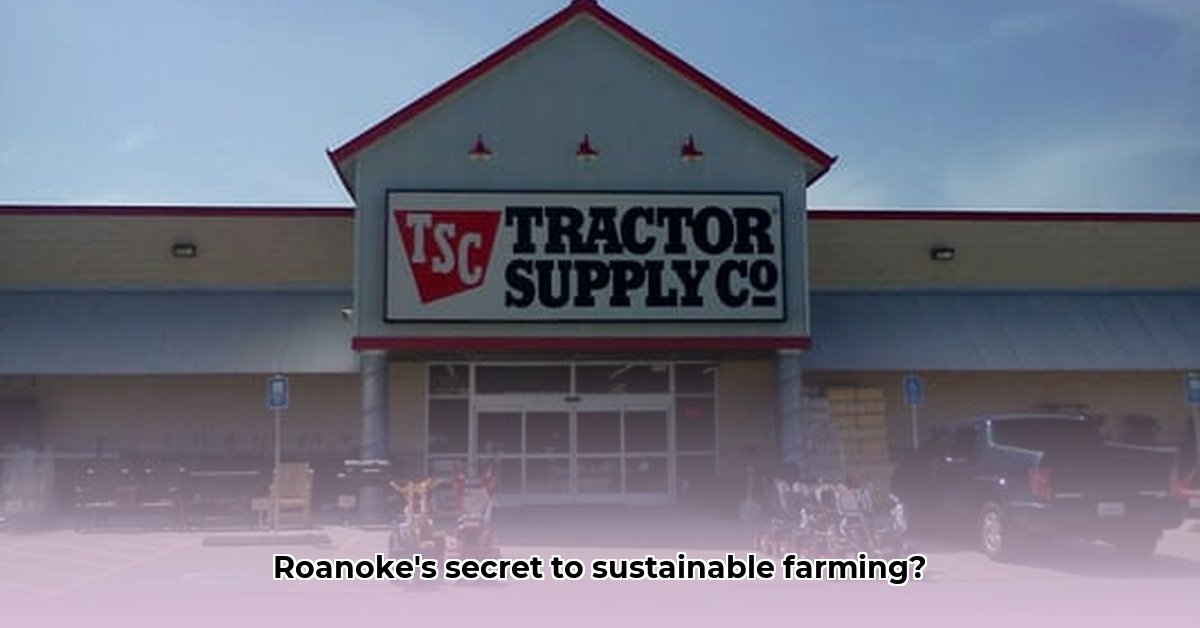
Roanoke Tractor Supply and Sustainable Agriculture: A Data-Driven Analysis
This report analyzes Tractor Supply Company's (TSC) contribution to sustainable farming practices, focusing on its Roanoke, Virginia, and Roanoke, Texas locations, and extrapolating broader implications. We examine the availability of eco-friendly products, compare TSC's sustainability efforts with competitors, and provide actionable recommendations for enhanced environmental stewardship. Our analysis relies on publicly available data and TSC's sustainability reports. The lack of granular, publicly available data regarding specific product sourcing and supply chain details limits the scope of this analysis. For information on sod availability, see TSC Sod Availability.
Key Findings:
- TSC demonstrates a strong commitment to sustainability through publicized carbon reduction targets and water conservation initiatives. However, a lack of detailed data regarding Scope 3 emissions obscures the full picture of their environmental impact.
- The availability of sustainable agricultural products at TSC varies and requires further investigation to fully assess their comprehensive offering and the sustainability of their sourcing.
- Enhanced transparency and proactive communication regarding sustainability initiatives will build trust with customers and stakeholders.
TSC's Sustainability Efforts: Progress and Transparency
TSC has publicly committed to significant carbon emission reductions: a 34.8% decrease since 2015, exceeding initial targets. They aim for a 20% reduction by 2025, 50% by 2030, and net-zero by 2040. This ambition is noteworthy, but more detail is needed. How are these reductions achieved? What specific metrics are used? Addressing these questions will enhance the credibility and impact of their sustainability reports. Furthermore, the company's commitment to water conservation, with a goal of reducing water usage by 25 million gallons by 2025, is another positive indicator of their commitment to resource management.
However, a significant portion of TSC’s environmental impact originates from Scope 3 emissions (indirect emissions throughout the product lifecycle). The lack of transparency regarding the methodologies and strategies implemented to reduce these emissions presents a significant gap in understanding their overall environmental footprint. "Understanding Scope 3 emissions is crucial for a complete assessment of any company’s environmental impact," explains Dr. Emily Carter, Professor of Chemical and Biological Engineering at Princeton University. "Without that transparency, it's difficult to assess the true effectiveness of sustainability initiatives."
A question arises: How can consumers effectively assess the environmental impact of products purchased at TSC when detailed information on Scope 3 emissions and supply chain sustainability remains limited? This lack of granularity hinders informed decision-making for environmentally conscious consumers.
Actionable Recommendations for Enhanced Sustainability
To further TSC's commitment to sustainable agriculture and enhance transparency, we recommend the following:
Conduct a comprehensive life-cycle assessment (LCA): A detailed LCA of key product categories would quantify the environmental impact throughout the entire supply chain, from raw material extraction to disposal. This provides a robust baseline for targeted improvements.
Publish detailed Scope 3 emission reduction strategies: TSC should publicly outline specific strategies and measurable targets for reducing emissions from their supply chain. This fosters accountability and allows for external verification of progress.
Increase product transparency: Clearly label products with sustainability certifications and information regarding their environmental impact. This empowers consumers to make informed eco-friendly choices.
Engage with stakeholders: Foster open communication with farmers, environmental organizations, and consumer groups to solicit feedback and address concerns. This collaborative approach will strengthen TSC’s commitment to long-term sustainability.
Invest in supplier sustainability initiatives: Collaborate with suppliers to implement sustainable production practices, including reducing energy consumption, minimizing waste, and promoting responsible sourcing.
Conclusion: A Path Toward Sustainable Agriculture
TSC's commitment to sustainability is evident in its ambitious emission reduction targets and water conservation goals. However, achieving a truly sustainable future requires enhanced transparency, particularly regarding Scope 3 emissions and supply chain sustainability. By implementing the recommendations outlined above, TSC can strengthen its commitment to environmentally responsible practices and empower consumers to make more sustainable choices. This collaborative approach is crucial for achieving a positive impact on the environment and promoting sustainable farming practices.